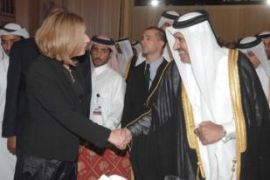Israeli minister visits Qatar
Tzipi Livni makes her first visit to Gulf emirate for talks with senior leaders.

Sheikh Hamad also said that he did not want to put the meeting in the context of mediation between Israel and Hamas, a Palestinian movement which controls Gaza.
Asked if Qatar was aiming towards brokering a prisoner exchange involving Corporal Gilad Shalit, an Israeli soldier captured by fighters in Gaza last June, Sheikh Hamad said: “We will wait to see what she has to say … on this subject.”
Sheikh Hamad, who also holds the post of foreign minister, said that the country wants to see a peaceful resolution between the West, Israel, and Iran over Tehran’s nuclear programme.
“Iran is a neighbour and is important to us. Stability is also important in the region and we are always keen on seeing any issue in the region resolved peacefully, especially with regard to Iran,” he said.
Livni is the most senior Israeli official to visit Qatar since Shimon Peres, currently Israel’s president, went to Doha for a television debate last year as deputy prime minister.
Qatar has low-level trade relations with Israel, but no formal diplomatic ties. Doha has good diplomatic relations with Tehran.
Carter-Hamas meeting
As Livni arrived in Qatar on Sunday, Mahmoud Abbas, the Palestinian president and Fatah leader, met Ehud Olmert, Israel’s prime minister.
An Israeli official said that the unscheduled talks were to “co-ordinate” peace issues before Abbas travels to Washington on April 23 for meetings with US leaders.
While Fatah is the choice of Israel and the Quartet of Middle East diplomatic negotiators (the US, the EU, Russia and the UN) to act politically on behalf of the Palestinians, Hamas is banned from the peace process.
Israel and the Quartet say that Hamas cannot enter negotiations unless it renounces violence, recognises Israel as a state and abides by previous peace agreements.
For its part, Hamas says that Israeli security policies, continued illegal settlement expansion and an economic blockade on Palestinian territories preclude an end to what it calls “resistance activities”.
Jimmy Carter, a former US president, is set to meet Hamas leaders during a trip this week to the Middle East, despite criticism from Israel and Washington.
Carter reportedly plans to meet Khaled Meshaal, Hamas’s exiled leader in Syria, during his trip.
“It’s very important that at least someone meet with the Hamas leaders to express their views, to ascertain what flexibility they have, to try to induce them to stop all attacks against innocent civilians in Israel and to co-operate with the Fatah as a group that unites the Palestinians,” Carter told ABC news.
“There’s no doubt in anyone’s mind that, if Israel is ever going to find peace with justice concerning the relationship with their next-door neighbours, the Palestinians, that Hamas will have to be included in the process,” he said.